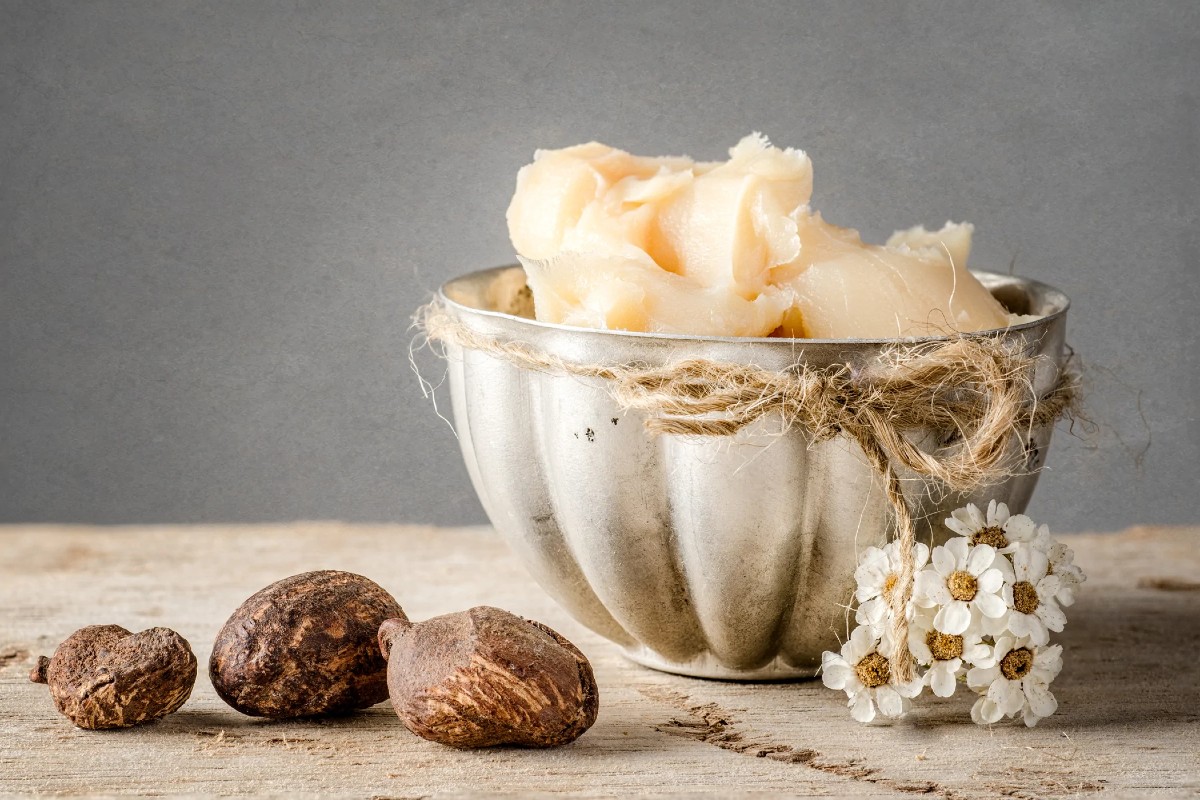Shea Butter In Skincare: What Is It Good For?


Ah, shea butter, the true OG of the skincare world. Even Cleopatra carried clay pots filled with shea butter wherever she went.[1] Rich in composition and history, keep reading to learn more about why shea butter is a centuries-old staple and why you should add it to your beauty routine.
What is shea butter?
Shea butter is a nutrient-rich emollient packed with vitamins and antioxidants that come from the African shea tree (Vitellaria paradoxa). It contains several types of essential fatty acids like linoleic, oleic, palmitic, and stearic acids.[2] All these fatty acids plus the antioxidants and vitamins give shea butter the ability to improve the skin’s natural barrier, protect against pollutants, heal skin irritations like eczema, and so much more.
Shea butter benefits for skin
- Hydrates: For those struggling with dehydrated skin, shea butter is a holy grail hydrator. This is because the fatty acid content in shea butter helps restore moisture to the skin and reduce water loss.[3] More than that, its occlusive properties coat the skin’s surface with a protective layer to keep moisture in and lock pollutants like free radicals out. With the right amount of hydration added by shea butter, you’ll notice a more plump and dewy appearance.
- Softens: The triglycerides in shea butter nourish and condition the skin almost instantly.[3] When applied topically, the natural heat coming from your body turns the butter into an oil consistency. This allows for faster absorption and instant delivery of moisture to relieve cracked and damaged skin.[4]
- Repairs: Shea butter is rich in vitamins E, A, and F, which promote circulation and cell growth, meaning it boosts collagen production. Collagen is what allows your body to heal things like scars, marks left by acne, and other dark spots. Studies have shown that using shea butter signals your body to make more collagen and initiate an immune response that speeds up the wound healing process. You can thank the triterpenes found in shea butter which have been proven to repair skin tissues.[3]
- Protects: Thanks to its antioxidant and occlusive properties, shea butter shields the skin against environmental aggressors while working to scavenge the free radicals that have already entered the skin. This could be effective in preventing photoaging and sun damage.
- Soothes redness: Free from chemical irritants, shea butter is an all-natural alternative to soothe redness. Studies have shown it’s just as effective as ceramides for preventing irritation and relieving the skin’s barrier.[3] This is thanks to its anti-inflammatory and soothing effects, which come from its compounds that work to send signals to the cytokines (modulators of inflammation) to slow down.
What is shea butter good for in skincare?
Given all the benefits, shea butter is effective in addressing a wide array of skincare concerns, including:
- Dehydrated skin
- Cracked skin and broken barrier
- Inflammation, irritation and redness
- Dermatitis and eczema
- Excess sebum, acne, and scars
- Fine lines and wrinkles
- UV damage and sunburn
Is it safe?
Shea butter is a 100% safe ingredient for the skin. It is also non-comedogenic, so you don’t have to worry about clogging your pores.
How to use
It’s best to use raw and unrefined shea butter since it contains all of the essential vitamins and nutrients. Refined versions can still have the same hydrating effects, but they might lose some of the shea butter’s healing properties due to processing. You can also use skincare products containing shea butter like Olay Quench Shea Butter.
References
Women’s Concepts uses reliable sources, including dermatologists’ insights, clinical trials, and scientific journals, to find accurate information and support all the facts shared in our articles. All statements and claims have clear and legit references. Read our editorial policy to learn more about our sources of information, our process of researching and fact-checking the content, and how our team strives to keep all articles updated, completed, and trustworthy.
- Quality characteristics of West African shea butter (Vitellaria paradoxa) and approaches to extend shelf-life, Nahm, Hee Seung, Rutgers The State University of New Jersey – New Brunswick ProQuest Dissertations Publishing, 2011, https://www.proquest.com/openview/63a7c95fa7532abc50bf8bf603620c41/
- Lin T-K, Zhong L, Santiago JL. Anti-Inflammatory and Skin Barrier Repair Effects of Topical Application of Some Plant Oils. International Journal of Molecular Sciences. 2018, https://doi.org/10.3390/ijms19010070
- Lin TK, Zhong L, Santiago JL. Anti-Inflammatory and Skin Barrier Repair Effects of Topical Application of Some Plant Oils. Int J Mol Sci. 2017 Dec 27, https://www.ncbi.nlm.nih.gov/pmc/articles/PMC5796020/
- Malachi Oluwaseyi Israel, Effects of Topical and Dietary Use of Shea Butter on Animals, American Journal of Life Sciences. Volume 2, Issue 5, October 2014, https://www.sciencepublishinggroup.com/journal/paperinfo.aspx?journalid=118&doi=10.11648/j.ajls.20140205.18








